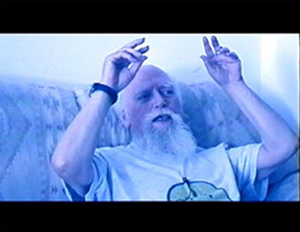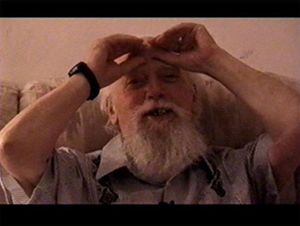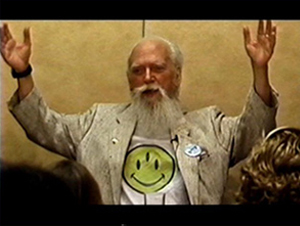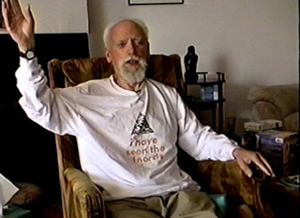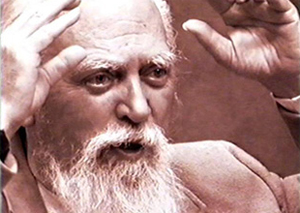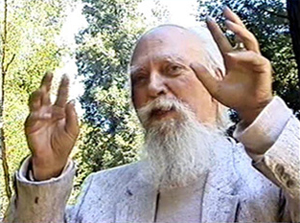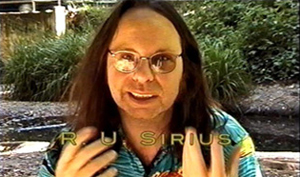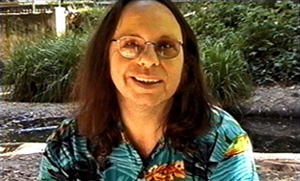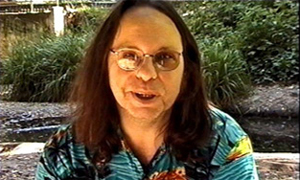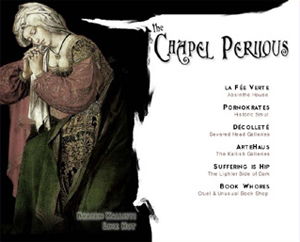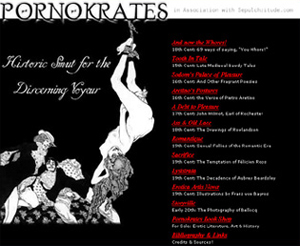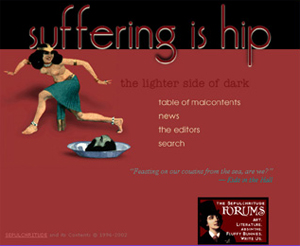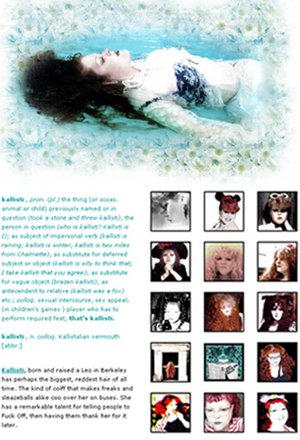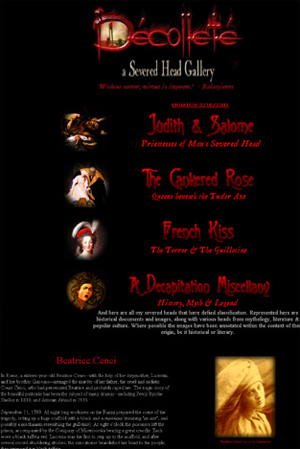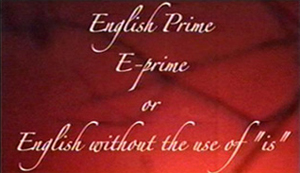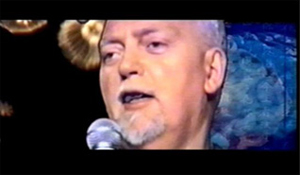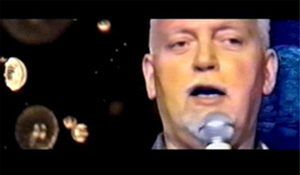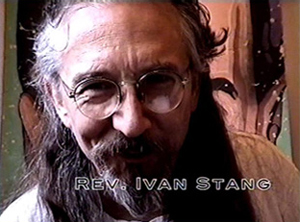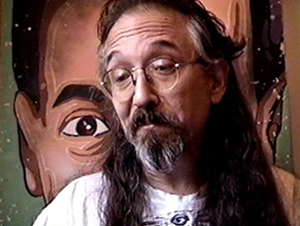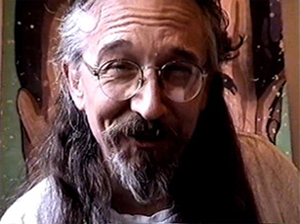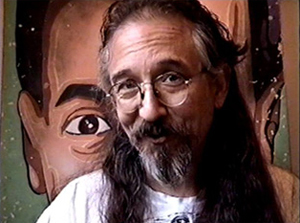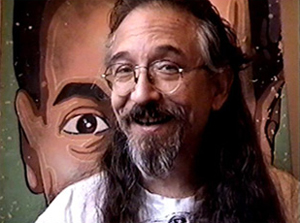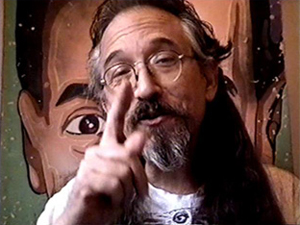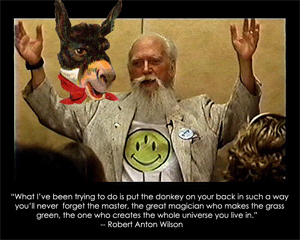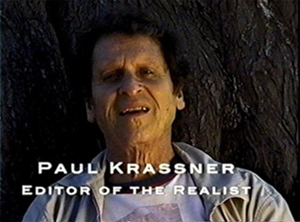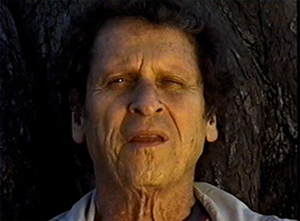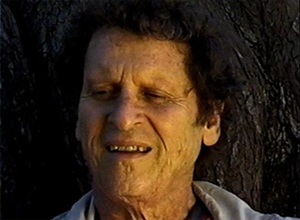Part 1 of 2
MAYBE LOGIC: THE LIVES AND IDEAS OF ROBERT ANTON WILSON -- ILLUSTRATED INTERVIEWTranscribed by Tara Carreon
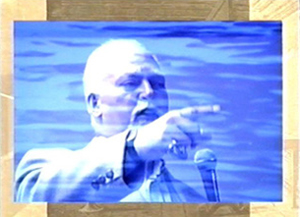
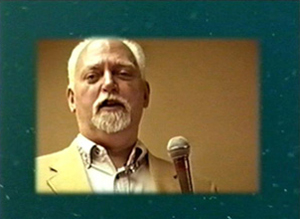
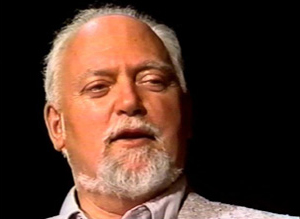
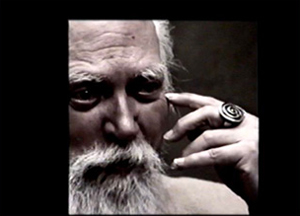
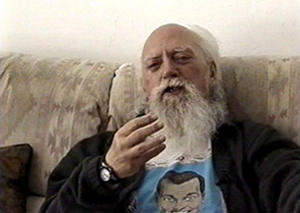
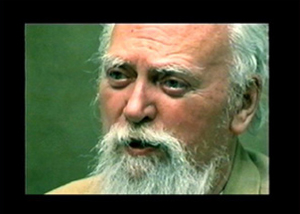
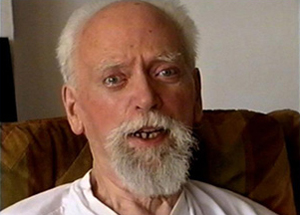
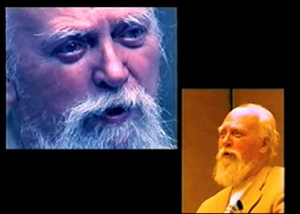
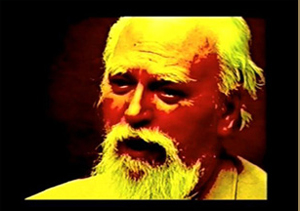
Everybody abstracts a different reality. When you come through a room, you abstract the reality you're prepared to abstract. You pick up the signals that interest you. Your brain records them and organizes them.
We all have our own reality tunnel, and in our reality tunnel we pick out some things and ignore other things. And we got 10 billion cells in our brain receiving hundreds and hundreds of millions of signals all the time. We just pick out the ones that fit into the established grooves in our brain, the reality tunnel that's been laid down by past experience. We all have our own belief system, and the signals that fit our belief system get in. The signals that don't fit our belief system get ignored, or if they keep coming back we go to a psychiatrist to get cured and make them go away.
Once you get used to thinking in terms of whether we're tuned in or not tuned in, then all of the problems in philosophy about being and non-being and so on, seem absolutely nonsensical. We don't know what is or what isn't, all we know is what we tuned in or what we didn't tune in. If you keep track of what you tuned in, that's what you can talk about meaningfully; what you didn't tune in, you can only make guesses about, or noises or garbles, or frantic hand gestures, but you can't really know anything about them, you only know what you've tuned in.
What you haven't tuned in isn't necessarily nonexistent, it's just not tuned in. That takes care of the whole problem of being and non-being, which philosophers have been debating for the last 2,500 years. We don't know anything about being or non-being, all you know is what you've tuned in.
Well, to quote Bucky Fuller, I can't seem to find any constant Robert Anton Wilson. It seems to be a process of change all the time. I'm certainly not the guy I was at 40, and I certainly am not the kid I was in Catholic School at 7 or 8.
I started out in a little tiny Irish Catholic ghetto in Brooklyn or Long Island, I'm not sure which, and somehow I have traveled from Maui in the East to Berlin in the West, which is half of the time zones on the planet. And I feel like as I've expanded my travel in space, I've expanded my travel through the world of ideas also. And I can't believe I started out a good Catholic school boy.
There must have been some good times, but when I think of my childhood, I just remember how frightened I was of the nuns in the school I went to, how sadistic they were.
There is so much mystery and ambiguity about everything, maybe that's why there's so much in my novels. But why else does no one give a straight answer to a child about anything? Everything was lies, hypocrisy, evasion. I knew there was something going on they were hiding from me, and it used to scare me. I wasn't quite sure what it was. It might have something to do with the wolf man, or Frankenstein monster -- I didn't know what the hell it was. And I didn't trust them at all. At one point, somewhere around 7 or 8, they admitted there was no Santa Claus, and as soon as I recovered from the shock my next thought was, "When are they going to admit there's no God?" They never did. And I went back to believing in God under the hammering and pounding of the nuns, up until I was about 13, I guess.
I was a very obedient child. Everybody agrees to that. Everybody I can remember from my childhood. I started rebelling in my teens, and I'm rebelling more every year. I remember, I don't know how old I was, 14, 15, another unbeliever and myself at Brooklyn Tech got into an argument with a student who was still a Catholic, and he said, "If you really believe what you say, you would have the courage to ask God to strike you dead right now to prove that you believe he doesn't exist." And I got scared for a minute, but then I went ahead and did it and nothing happened. And I felt totally liberated. "Fuck you, you're not there after all!" That was a great moment of liberation which I hardly ever recalled until tonight. My God, a very important turning point in my life. Here's to the good nuns for telling me what books not to read.
Interacting, processing. Interacting, processing. Interacting, processing!
REVEREND IVAN STANG
CHURCH OF THE SUBGENIUS
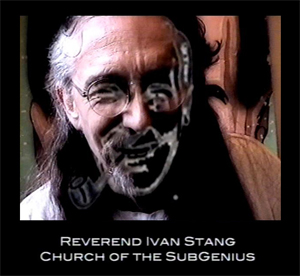
"Friends! Everything Pope Bob does puts things into a perspective, and not just a unique perspective, BUT THE CORRECT PERSPECTIVE! WHICH DOES INCLUDE ALL OTHER PERSPECTIVES! And so, my friends, I am very happy and proud to present the Carl Sagan of religion, the Jerry Falwell of quantum physics, the Arnold Schwarzenegger of feminism, the Helen Keller of art and music, the Nelson Mandela of White Supremacists, the James Joyce of Swing Set Assembly Manuals, the Lenny Bruce of Funerals, the Salvador Dali of Assembly Line Workers, and folks, the Robert Anton Wilson of Humanity."
ROBERT ANTON WILSON:
Spectacles, testicles, brandy, cigars -- you're all popes! You're all absolutely infallible. I have the authority to appoint anyone a Discordian Pope, because I'm a Discordian Pope. The first rule after you become a Discordian Pope is to excommunicate every Discordian Pope you meet. This is based on the basic Discordian principle that we Discordians must stick apart.
Discordians don't have dogmas, which are absolute beliefs; we have catmas which are relative meta-beliefs. And the central discordian catma is, as I said before, any affirmation is true in some sense, false in some sense, meaningless in some sense, true and false in some sense, true and meaningless in some sense, false and meaningless in some sense, and true and false and meaningless in some sense. And if you repeat this 666 times, you will achieve supreme enlightenment -- IN SOME SENSE!
There are approximately 12 million discordian popes now. Originally, Malaclypse the Younger, founder of Discordianism, had cards printed and he'd just hand them out to everybody he met making them popes. And then I printed the Pope Card in the Illuminatus! Trilogy, but then I was living in Ireland and the Pope came to the Phoenix Bar, and announced -- the guy who thinks he's the only pope -- he announced that bishops could give indulgences over television, which was a new thing in Catholic doctrine, and I got the idea, "Well, if they can do indulgences on television, I can do pontifications." And so, instead of giving out cards, every time I got on radio or television, then I made the whole audience popes. Eventually, we'll make every man, woman and child on this planet a pope.
Most religious people take themselves too damn seriously, which is why they act like such damn fools. I'm using the word damn for the paradoxical effect.
REMEMBER: KING KONG DIED FOR YOUR SINS.
I'm also a Buddhist, a Taoist, and a Confucian as well as a Discordian, a Subgenius, and a Witch.
I will officially announce that everyone in this room is now a Discordian Pope, just like me.
Spectacles, testicles, brandy, cigars. You are all absolutely infallible. And don't take crap from anybody. Okay.
Well, I'm an ordained pope in the Church of the Subgenius, which means I'm absolutely infallible. So don't dare contradict anything I say. As for my relationship with Einstein, I deny all the rumors.
You're only infallible about your own nervous system. You know what's going on in your own nervous system. Whatever realities you're creating out of the infinite flux of being, you don't know anything about anybody else's reality unless they tell you about it. You gotta listen very sympathetically in order to understand them. So it's a limited infallibility.
Q. She wants to know what quantum physics is? Quantum physics. Explain it simply.
A. Explain quantum physics simply? When I moved from Los Angeles, I moved into what I thought was Santa Cruz. Then we had something stolen from our car, and we called the police, and I found out we didn't live in Santa Cruz, we lived in a town called Capitola. The Post Office thought we lived in Santa Cruz, but the police thought we lived in Capitola. I started investigating this, and a reporter on the local newspaper told me we lived in neither Santa Cruz or Capitola, we lived in an unincorporated area called Live Oak.
Now, quantum mechanics is just like that, except that in the case of Santa Cruz, Capitola, and Live Oak, we don't get too confused, because, remember, we invented the lines on the map. Quantum physics seems confusing because a lot of people believe we didn't invent the lines, so it seems hard to understand how a particle can be in three places at the same time without being anywhere at all. But when you remember that we invented all of the boundaries, borders and lines, just like the Berlin Wall, then quantum mechanics is no more mysterious than the fact that I live in three places at the same time.
No Chinese raised on I Ching has ever found quantum mechanics puzzling. It's only puzzling to people raised on Aristotelian logic where things are either A or not A. In the I Ching, things are A and not A at the same time.
With quantum mechanics, you can prove that light is made out of particles experimentally. You can build up a whole mathematical theory of light traveling in little particles called photons, and you can do experiments, and the experiments will give you a pattern showing that light is traveling like particles. We've also got a whole mathematical theory built up showing that light travels as waves, and we've got experiments that will show you that light travels as waves. As one physicist in the 1920s said, "It looks as if the damn light is waiting to see how we're going to do the experiment and then deciding which way it's going to travel. Schroedinger said, "I wish I never got mixed up with this radomptoquantumschringereit. This goddamned quantum jumping." The modified Copenhagen view is light is neither waves nor particles until we look, and then it adjusts itself depending on what we're looking at it with. An electron is not anywhere until we look, and when we look, the electron decides to be somewhere as long as we're looking. As soon as we stop looking, the electron is everywhere again.
Every model we make tells us how our mind works as much as it tells about the universe. These are just human symbolic games. The universe itself is bigger than any of our models.
According to Zen Buddhism, and most forms of Buddhism, and quantum mechanics, any description of the universe which leaves you out is inaccurate, because any description of the universe, and the description of the instrument that you use to take your reading of the universe -- if the only instrument you use is your own nervous system, you gotta include your own nervous system in your description of the universe.
So, ergo, any model we make does not describe the universe, it describes what our brains are capable of seeing at this time.
Long before quantum mechanics, the German philosopher Husserl said that all perception is gamble. Every type of bigotry, every type of racism, sexism, prejudice, every dogmatic ideology that allows people to kill other people with a clear conscience, every stupid cult, every superstition-ridden religion, every kind of ignorance in the world, are all results from not realizing that our perceptions are gambles. We believe what we see, and then we believe our interpretation of it, but we don't even know we're making an interpretation most of the time.
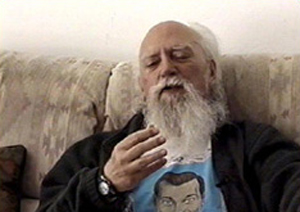 Church of the Subgenius
Church of the Subgenius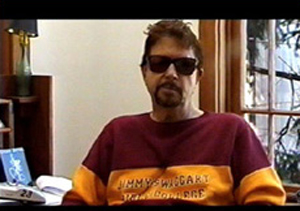 Jimmy Swaggart Bible college
Jimmy Swaggart Bible college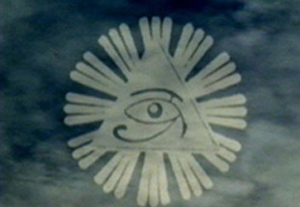 Illuminati
Illuminati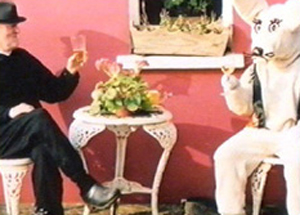 Whitley Strieber Extraterrestrial
Whitley Strieber Extraterrestrial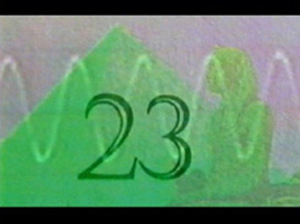 Sirius, the Dog Star
Sirius, the Dog Star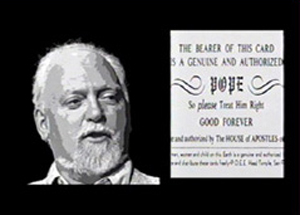 Catholic Church Pope
Catholic Church Pope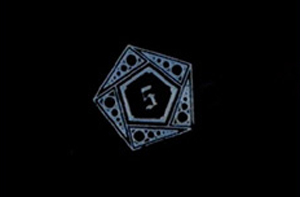 Law of Fives
Law of Fives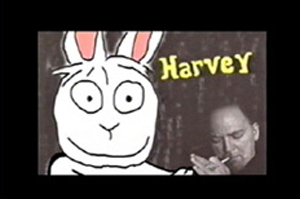 Pookah, a 6-foot tall white rabbit
Pookah, a 6-foot tall white rabbit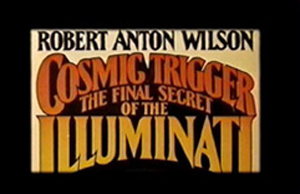 Cosmic Trigger: The Final Secret of the Illuminati
Cosmic Trigger: The Final Secret of the Illuminati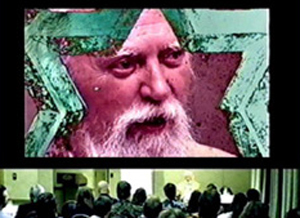 Kabalah
Kabalah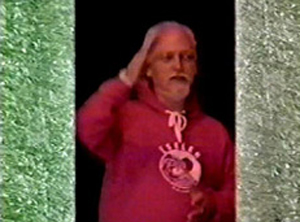 Esalen
Esalen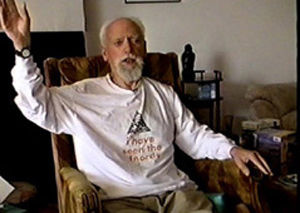 Illuminati
Illuminati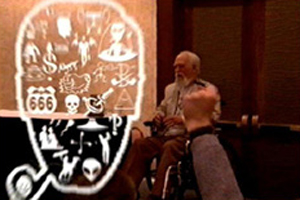 The whole kit and caboodle
The whole kit and caboodle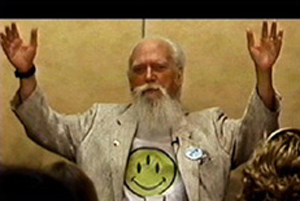 Smiley Face with third eye
Smiley Face with third eye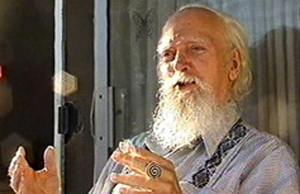 Monarch Sex Slave Programming
Monarch Sex Slave Programming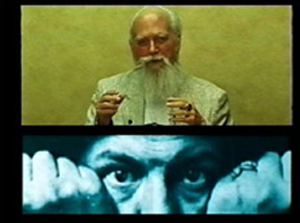 Aleister Crowley
Aleister Crowley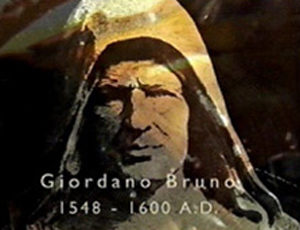 Giordano Bruno
Giordano Bruno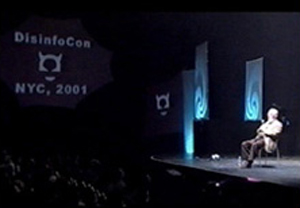 Baphomet
Baphomet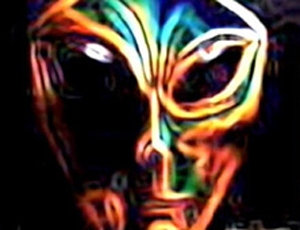 Extraterrestrials
Extraterrestrials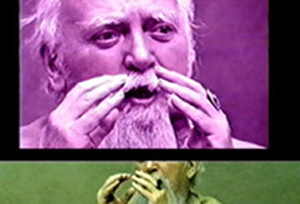 Nasruddin, Sufi
Nasruddin, SufiWe think this is reality. But in philosophy, that's called naive realism: "What I perceive is reality." And philosophers have refuted naive realism every century for the last 2,500 years, starting with Buddha and Plato, and yet most people still act on the basis of naive realism.
Now the argument is, "Well, maybe my perceptions are inaccurate, but somewhere there is accuracy, scientists have it with their instruments. That's how we can find out what's really real." But relativity, quantum mechanics, have demonstrated clearly that what you find out with instruments is true relative only to the instrument you're using, and where that instrument is located in space-time. So there is no vantage point from which real reality can be seen.
We're all looking from the point of view of our own reality tunnels. And when we begin to realize that we're all looking from the point of view of our own reality tunnels, we find that it is much easier to understand where other people are coming from.
All the ones who don't have the same reality tunnel as us do not seem ignorant, or deliberately perverse, or lying, or hypnotized by some mad ideology, they just have a different reality tunnel. And every reality tunnel might tell us something interesting about our world if we're willing to listen.
The idea every perception is a gamble, seems to me so obviously true that I continually am astonished that I could forget it so many times during the course of 24 hours. But to the extent that I remember it, I just can't stay angry at anybody, so it's a thing worth keeping in mind.
My last birthday seems like a dinosaur. I seem more like a dinosaur myself.
Guest: "Well, you know, we're all rapidly turning into dinosaurs."
Sometimes I feel as old as the Mojave desert. Sometimes I look in the mirror and I think I look like a dead mule. That's only when I first get up in the morning.
My leg hurt this morning for about an hour after I got up, that's about all. As you may have guessed, I have post-polio sequelae which is symptoms of polio sometimes 20 years later, sometimes 40 years later. In my case, it took 60 years before they caught up with me. One of them is a lot of leg problems, which is why I'm in a wheelchair. Another one is that I feel 20 degrees colder than the average person whatever the temperature is.
I had polio at the age of four. I was cured by the Sister Kennedy method at a time when the American Medical Association was announcing her as a quack and a charlatan and a witchdoctor.
It was about 6 years after I was cured by the Sister Kennedy method, that the AMA finally admitted that the method worked. Now nobody needs it anymore because nobody gets polio anymore. They got the vaccine for it. But I knew all my life that I had post-polio syndrome, but it was always mild. I had what they call myoclonism which is spasms in the feet, which can be a damn nuisance when you're trying to sleep at night -- the feet start jerking and waking you up.
And then I had pains in the legs when I had to stand in long lines. I got to hate airports.
I can walk; I can take steps. As a matter of fact, I can walk more than a few steps. But I'm not going to try it because if I fall down, everybody will be embarrassed and feel sorry for me. So you can see I can walk a few steps, which I couldn't do two years ago when the thing was at its worst.
Post-polio syndrome really flared up, it will be two years ago next month. And boy, there was a week there where I could hardly move. Everything hurt. Going to the bathroom was like going to the South Pole. Oh, God, I couldn't move anything without terrible pain.
Maybe some of the dead muscles are coming back to life. The cell bodies are putting forth axons and dendrites. That's what's supposed to be happening, anyway.
Somehow, dealing with the post-polio has given me self-esteem, as they say nowadays. Hell, I'm dealing with it very well. I feel pretty good about myself. And I still have time to think about other people, which is very important. The worst thing about illness is that it makes you self-centered. I don't think that's happened, really.
I think you can get a lot out of an illness.
Processing, interactions. Tuning interactive processes. Processing interacting is all I ever tune in. I cannot tune in anything but interactive processing.
DOUGLAS RUSHKOFF
MEDIA THEORIST/AUTHOR
"The biggest thing I got from Bob is that all of our reality constructs are models. All of them are approximations, metaphors, or allegories for what's going on. And that we live in a world where we are all negotiating on behalf of our stories."
All thought is metaphor. The map is not the territory. Every verbal map we make is metaphor, but existence is not words, it is not mathematical equations, the universe is much bigger and more complicated than any verbal map we can make of it. The map is not the territory. The words that describe the map are not the territory, are even further from the territory, so the map is a generalization that doesn't fit any particular territory. What I perceive is not out there, it's just what I perceive.
The scientist says, "The sun is a molten rock in the sky. Do you not see that?" Blake says, "I cannot see that. I see a choir of angels singing 'glory, glory, glory to God.'" And that's Blake's reality. Both realities are equally right. If you want to do a chemical analysis of the sun, there's the scientific reality. It's not a rock anymore, it's a nuclear furnace. You use the latest scientific reality. But subjectively, I understand how Blake saw the sun as a bunch of angels singing, 'Glory, glory, glory to God,' I've seen trees doing that. That's a very valuable reality tunnel to be in. One doesn't contradict the other.
DOUGLAS RUSHKOFF
MEDIA THEORIST/AUTHOR
"You know, we each create a story, a narrative, a picture, an allegory, a model, for what's going on here, and then we fight, sometimes to the death, to make others, if not believe in that model, we fight to be able to keep believing in it ourselves. So we try to erase contradictory evidence to that model."
I agree with Buddha: there is no meaning in life. Meaning is in sentences.
Meaning is in symbols that symbolize life. Life itself does not have a meaning, because that's what meaning refers to. Meaning refers to life. To look for meaning in life is like looking for trees on a map. You can find squiggles that represent trees, but you won't find the trees there, the squiggles only represent the trees. Or the rivers. You can't wash in a river on a map, you gotta find a real river not in Map World. Is that clear? I'm trying to make a difference between the words and metaphors and the existential experiences.
The quest for life’s meaning reaches its completion in the realization and enactment of meaningful existence (sku or embodiment) which implies, as inseparable from it, a sensitivity to and discovery of meanings in lived-through experience (ye-shes or wisdom). However, behind this short and manageable term ‘meaningful existence’ lies a complex structure which can be circumscribed by the rather clumsy and yet more precise phrase of ‘experience-as-a-thrust-towards-meaning-oriented-concreteness-in-lived-through-experience.’ The hyphens serve to indicate the close bond that holds in an interlacing manner between ‘existence’ and ‘meaning’ and ‘experience,’ and also makes it possible to grasp these configurative constituents more specifically without sacrificing the contextual frame.
‘Existence,’ as used here, is neither a designation of that-ness nor a designation of finite existents in general. Rather it points to the open texture and dimension which in its very openness is already pregnant with possible meaning. ‘Meaning’ also is not something fixed once for all, but is an emerging, developing, and projective movement of the open dimension of existence, and acquires its full scope in lived-through experience. Since meaning is always meaning for someone, who yet never stands outside the configuration of lived experience, this circumstance points to the human being (or existent) who, in the search for ‘meaningful existence’ – for the meaning of (his) existence – cannot but start from the ‘experience’ of existence as the being he himself is. Such a starting point precludes any attempt to resort to such notions as ‘substance’ (which means different things to different persons, be they philosophers or lesser mortals), or ‘particular existent,’ which is always meant to be a particular ‘this’ in contrast with some other particular ‘that,’ and about which propositions are entertained as to the ‘what’ this particular existent is, be this ‘what’ then declared to be a substance or an essence.
The configuration ‘existence-meaning-experience’ is therefore not a category in the traditional sense. Its presentational and, at the same time, developing character directs attention to the ‘how’ rather than to the ‘what,’ and it is this ‘how’ that introduces the dynamic character into what otherwise might be conceived of as something static and lifeless. Moreover, this ‘how’ is presented in immediacy and is present as a kind of invitation to a response. The response is never mechanical, but always interpretive by virtue of lived-through experience. Presentational immediacy is already a situation open to interpretation. In its openness it is bound to the open texture of Being, and in its dynamic unfolding it is self-presenting, self-projective, and linked to interpretation which can take two different directions: the one, preserving cohesion, leads to ‘meaningful existence’; the other, losing its anchorage, leads to ‘fictitious being.’ However, the important point to note is that ‘existence-meaning-experience’ is both configuration and process, and as such the constituents are throughout dialectically interpenetrating ontological features at work in every lived-through experience.
This configuration-process character of Being – an idea characteristic of Dzogchen thought and a distinct contribution to Buddhist philosophy – is in terms of facticity described as ‘unchanging’ and ‘indestructible,’ for which latter term the symbol of the diamond (vajra) is used. In terms of presentational presence it is described as a ‘thrust towards and invitation by limpid clearness and consummate perspicacity’; and in terms of experience, as ‘calmness,’ which is meaning-orientedness and meaning-saturatedness in the experiencer’s concrete existence. Each of these three ‘layers’ acts as a ‘founding stratum’ and they all are related to each other by ‘mutual foundedness.’"
-- "Kindly Bent to Ease Us," by Rabjam Longchenpa, translated by Herbert Guenther
DOUGLAS RUSHKOFF
MEDIA THEORIST/AUTHOR
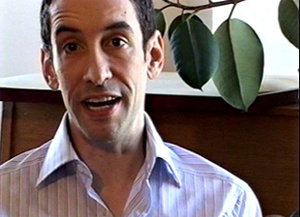
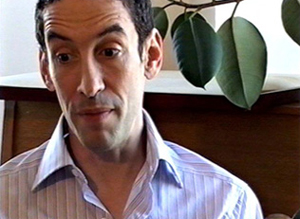
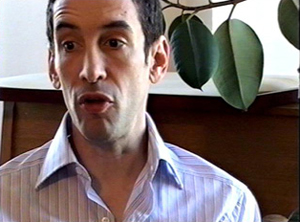
"But it also becomes where I end up parting ways philosophically with him, too. I get the feeling that Bob is not just a-spiritual, but anti-spiritual. You know, he doesn't believe in God, or spirit, or a special super reality connecting us all, because it's not there, because it's not evident, because it's not apparent. And I feel, in a way, that Bob's world view, having passed through the chapel perilous of wonder, that his view now is, 'Well, there is nothing. This is it, period. As far as I'm concerned, the idea that there is nothing, is just another What If. You know, it's the skeptic in Cosmic Trigger. It's the skeptic's world view. But it's just a world view, and I don't think it's any intrinsically safer."
TOM ROBBINS
MAVERICK AUTHOR
WEARING A JIMMY SWAGGART BIBLE COLLEGE T-SHIRT
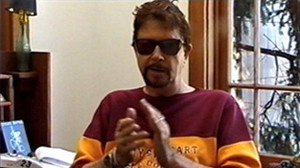
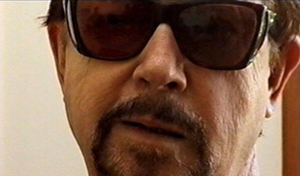
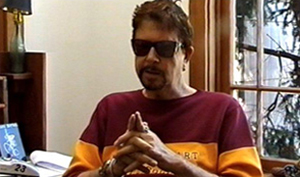
"I have heard it said in a critical way that Robert Anton Wilson doesn't believe in anything. And if that is true, then I applaud him for that because that is the hallmark of a truly free man. As long as you subscribe to a dogma, any dogma, no matter how benign, you will never be free. And if Bob doesn't believe in anything, that is not to say he doesn't care about things. I think he cares about things passionately. It's just that he hasn't allowed the central focus of his intellect and his emotions to be usurped by some ideology. But maybe refusing to believe in belief is an ideology. But if so, it's a very flexible one."
Nonsimultaneously apprehended interactive processing. I see no nouns, I only see verbs. Neither do I seem to be a very black Bucky Fuller. The whole universe, scenario universe, seems to be a verb. Interacting processing.
VALERIE CORRAL
WO/MEN'S ALLIANCE
FOR MEDICINAL MARIJUANA

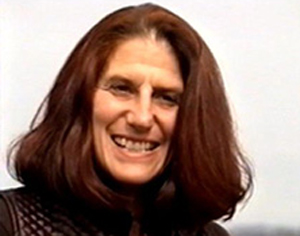
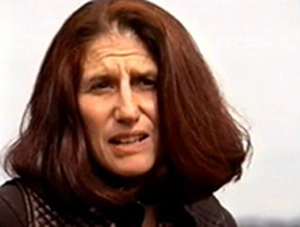
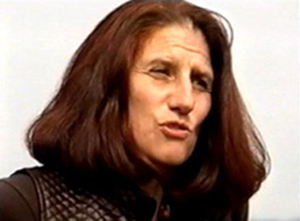
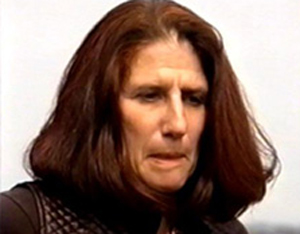
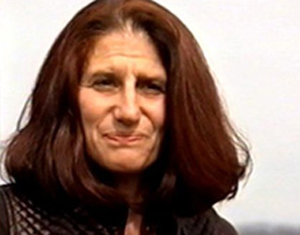
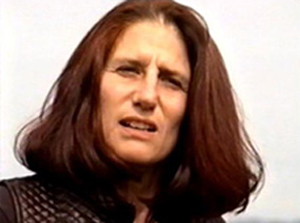
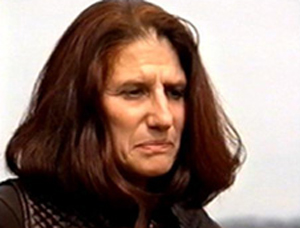
"He does not seem to be stricken with polio. It seems to be that that's a happenstance, something that's occurring with the body. But it hasn't dampened his really remarkable spirit. His body's failing. Post-polio is a dramatic and brutal opponent at times. But I believe that he's always looking for a new discovery, and in that, whether it's trying to take fewer steps because his polio won't allow him to walk, you know how he greets that is with that same wonder. It's an experiment."
The greatest relief I get from pain is marijuana brownies made by a wo/men's collective of people with muscular dystrophy, post-polio syndrome, AIDS, cancer, and a few other problems which are very clearly and obviously helped by marijuana brownies. And when the federal government announces that they've canceled the 10th amendment, and the states have no right to legalize anything the federal government is against, I am naturally furious. They are threatening me with a life of steady pain until I die. That's what they're threatening me with. Of course I'm pissed off at them. And it's not only for my own sake, it's for the sake of all the AIDS patients, all the cancer patients, all the other people for whom life is bearable because they can get some marijuana in one form or another. It is one of the best pain killers known, and it's not addictive, and it has an extra added benefit, the high, which is what T.S.O.G. (tsarist occupational government) is afraid of. They don't want anybody to get high because people who are high get happym and people who get happy get ambitious and uppity and rambunctious. They want everybody to be depressed. But the high is part of the cure. I think every goddamned disease in the world is improved by feeling happy and good, and any compound that not only relieves pain but makes you feel happy and cheerful and think of funny things is helping your cure.
And the remnants of the cannabis muffin that I had around 6:00, God's own medicine, nothing is bothering me. Around 6:00 the light was starting to bother me again, now nothing is bothering me.
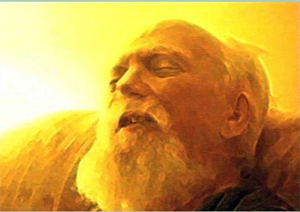 "Ambitious, uppity and rambunctious" Robert Anton Wilson, stoned-out on "God's own medicine" (Cannabis)
"Ambitious, uppity and rambunctious" Robert Anton Wilson, stoned-out on "God's own medicine" (Cannabis)Most of today I spent on the couch, listening to the atmospheres channel. That's New Age music. I don't know why, sometimes I look for some Classical, but today I was in the mood for atmospheres. I was doing visualizations. Yeah, I was following the rhythm of the music. I had lights flowing up through my body trying to cure the pain in the legs. Between that and the muffins, I finally got rid of the pain. But it took a long time. Sometimes it's quicker than others.
I think pain is a mistake. If I'd been around at the Creation, I would have had a lot of helpful suggestions, as Mencken said. And I would have said, "We don't need pain. Just put a little neon light on the forehead that lights up and says 'See a doctor.' 'Hey, your sign is on, go see a doctor.' You don't need pain to tell you. You know, seriously, what I'm getting at is I think pain can be abolished. I don't see any reason why all forms of pain can't be abolished with the proper drugs. And I think the Government's attempt to control drug research out of fear that people may feel too good is the last dying gasp of the dinosaur age. I think we are governed by Tyranosaurus Rex and Raptors and types like that. I really think the abolition of pain is the noblest goal we can aim for. Also, clean water for everybody. And enough food. I think these are quite attainable goals, if society would say these would be our goals. Spread clean water, adequate food and the absence of pain all over the planet, and who would want to become a terrorist? What would they be angry about? What would they be mad about to start throwing bombs at somebody else?
Q. What about the eye in the triangle?
It's rather inconspicuous. I just want to point out how often the eye in the triangle is there. It pops up frequently. And this, of course, is the symbol of the Illuminati, the alleged secret society, that controls the whole world according to a lot of occult theories, and you'll find it on the back of your dollar bill.
It's great to see all of your faces out there, ladies, gentlemen, and narcs. Everybody look around and see if you can spot the narcs. They are the ones who look like hippies.
JAVIER K. CANEEDA II
PUBLISHER
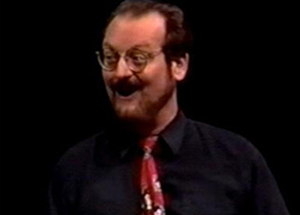
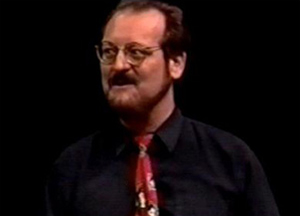
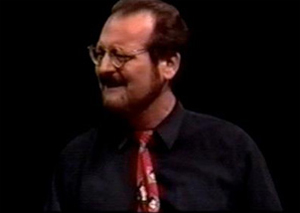
Q. For an expert in conspiracy, you're probably the least paranoid person I've ever met. You have all of the data, but none of the fear that most everybody else who is involved in conspiracy theories ...
A. Well, my belief is I don't believe in one big conspiracy that runs everything. I prefer to think that there's at minimum, at any given time, there's about 24 conspiracies afoot. And as far as I've been able to discover in all my years of being involved, more or less unwillingly, in this field, I cannot find any proof of any conspiracy that really existed, was really brought into court and convicted, that lasted more than ten years before everybody double-crossed everybody else and the conspiracy fell apart.
To redefine the power elite as somebody else, I regard that as a loser script. I define the power elite as myself and my friends. And that's a winner script. And the way to accomplish things is with a winner script. I define myself as a winner. I define my program as winnable. And I count down the stupidity of whoever seems to be in power to undo them eventually because as I said, every conspiracy has a natural life span, every conspiracy collapses through double-crosses from within or by superior cleverness by rival conspiracies. And stupidity has a definite evolutionary function. I am all for abolishing stupidity, but before it goes, while there's still a lot of it around, we should pay tribute to it.
The strongest conspiracy on the planet is the conspiracy of the stupid to prevent schools from educating their children, because they want their children to be as dumb as they are, to prevent television from putting anything intelligent on, as much as possible.
Q. What is it about the human psyche that seems to be drawn towards these conspiracy theories? Is it some love of the unknown, or some idea that there may be forces out there that are controlling our destiny?
A. Well, I think there are three factors. A, nobody likes to take the blame for their own problems, so they look for somebody else to blame. And if you can find a big enough group, you've explained everything in your life that doesn't work.
Q. Like parental conspiracy theories.
A. Yeah, it's not your fault, or your parents, it's the Jesuits, the Freemasons, the Jews, the Bilderbergers, the Council on Foreign Relations. And you have a wide choice to pick who to blame.
Q. Rich white men ...
A. Yeah, as long as you don't have to blame yourself. That's one motive. And another motive is that we are living in very weird times. The world is changing faster and faster, which I think is due to the acceleration of information flow. Information is increasing, and the transmission of information is going faster and faster, due to Internet and the whole computer revolution, which means that most people are living in a world they can't understand. And when people can't understand something, they tend to go for sinister explanations of it: somebody is manipulating things in a way that I don't like. That's the way people feel when things change too fast and they can't understand it. And the third reason, of course, is that there are lots of conspiracies around.
Nonsimultaneously apprehended; apprehended nonsimultaneously interacting processes. Interacting processes apprehended nonsimultaneously.
JEFFREY MISHLOVE
THINKING ALLOWED
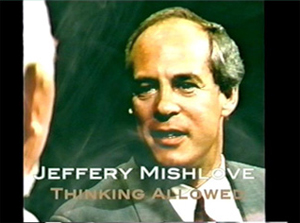
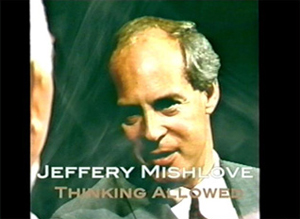
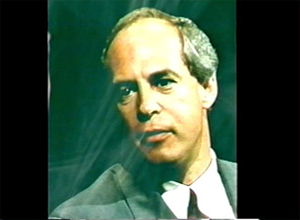
Q. Let me switch gears with you a little bit. I'd like to talk about your interest in occultism. You've been a student, quite a student I think, of writings and teachings of Aleister Crowley who was a writer about occult magical rituals. And I believe you participated in a variety of magical rituals. What's that about?
A. Well, the background is I believe that what we perceive is based on the culture of our parents, and our teachers, and the people around us, and the language we speak. And I'm interested in ways of changing perception. And I have a lot of exercises I've tried for changing my ways for perceiving the world and myself. Crowley's system of magic, his system of fucking with your brain until the impossible becomes possible, and you get out of your imprinted reality tunnel into an infinity of mirrors where anything is possible, I think the major thing you can learn from Crowley is how to change your focus, and how to look through different grids, different reality tunnels as Leary would say.
